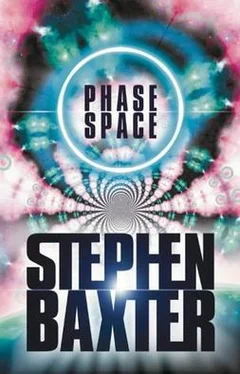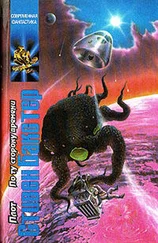Until what?
'Don't talk about astrology,' she whispered. 'Tell me about reality.'
… Okay. Why do we believe that the universe is real? Starting with Bishop Berkeley, the solipsists have wondered if the apparently external world is contained within the observer's imagination - just as this virtual abyss we share is contained within the more limited imagination of a bank of computers.
'I don't see how you could disprove that.'
Right. But when Boswell asked Dr Johnson about the impossibility of refuting Berkeley's theory, Johnson kicked a large rock and said, 7 refute it thus.' What Johnson meant was that when the rock 'kicked back' at his foot, he either had to formulate a theory of physical law which explained the existence and behaviour of the rock - or else assume that his imagination was itself a complex, autonomous universe containing laws which precisely simulated the existence of the rock - which would therefore, imagination plus rock, be a more complex system. You see? If we're
in a planetarium there must be some vast hidden mechanism that controls everything we see. It's simpler to assume that what looks real is real.
'Occam's razor.'
Sure. But Occam's razor is a guide, not a law of physics… And turn it around. What if the universe is a simulation? Then we can use Dr Johnson's criterion to figure out what is required of the controllers.
'I don't understand.'
The model universe must have a lot of industrial-strength properties. For instance it must be consistent. Right? In principle, anybody anywhere could perform a scientific experiment of the finest detail on any sample of the universe and its contents, and find the fabric of reality yielding consistent results. The rocks have always got to 'kick back' in the same way, no matter where and how we kick them. So you have to build your cage that way. Expensive, right?
And the environment has to be self-contained: no explanations of anything inside should ever require the captives to postulate an outside. Kate, I bet if you had been born in this darkness you could figure out there has to be something beyond. How could your consciousness have emerged from this formless mush?
And so on. The technical challenge of achieving such a deep and consistent simulation should not be underestimated - and nor should the cost… Oh. It just reached Jupiter. Wow, what a spectacle. You want to see?
Her field of view filled up abruptly with fragmentary images, bits of cloud fractally laced, stained salmon pink.
She turned away, and the images disappeared.
Strange thought, isn't it? What if Cornelius is right? Here you are in one virtual reality, which is in turn contained within another. Layers of nested unreality, Kate…
Kate felt a sudden revulsion. 'Wake up, wake up.'
For long minutes she immersed herself in gritty reality: the pine scent that came from the open window of her bedroom, the song of the birds, the slow tick of the old-fashioned clock in the wall. Reality?
On impulse, she closed her eyes. 'Wake up. Wake up.' The clock continued to tick, the birds to sing.
* * *
Civil defence programmes were activated, Cold War bunkers reopened, food stocks laid down. Various space probes were hastily launched to meet the advancing anomaly. There was even an extraordinary crash programme to send an astronaut team to orbit the Moon, now seen as the last line of defence between Earth and sky.
Kate knew the government had to be seen doing something; that was what governments were there for.
But she knew it was all futile, and in its own way damaging. Though reassuring talking heads from the President on down tried to tell people to keep calm - and, more importantly, to keep showing up at work - there was growing disruption from the preparations themselves, if not from the strange lights in the sky, still invisible to the naked eye.
Of course it all got worse when Cornelius's countdown timetable became widely known.
She did a little digging into the history of Cornelius Taine.
He had been an academic mathematician. She hadn't even recognized the terms his peers used to describe Cornelius's achievements - evidently they covered games of strategy, economic analysis, computer architecture, the shape of the universe, the distribution of prime numbers - anyhow he had been on his way, it seemed, to becoming one of the most influential minds of his generation.
But his gift seemed non-rational: he would leap to a new vision, somehow knowing its Tightness instinctively, and construct laborious proofs later. Cornelius had remained solitary: he attracted awe, envy, resentment.
As he approached thirty he drove himself through a couple of years of feverish brilliance. Maybe this was because the well of mathematical genius traditionally dries up at around that age. Or maybe there was a darker explanation. It wasn't unknown for creativity to derive from a depressive or schizoid personality. And creative capacities could be used in a defensive way, to fend off mental illness.
Maybe Cornelius was working hard in order to stay sane. If he was, it didn't seem to have worked.
The anecdotes of Cornelius's breakdown were fragmentary. On his last day at Princeton they found him in the canteen, slamming his head against a wall, over and over.
After that Cornelius had disappeared for two years. Emma's data miners had been unable to trace how he spent that time.
When he re-emerged, it was to become a founding board member of a consultancy called Eschatology, Inc.
She took this to Malenfant. 'Don't you get it? Here's a guy who sees patterns in the universe nobody else can make out - a guy who went through a breakdown, driven crazy by the numbers in his head - a guy who now believes he can predict the end of humanity. If he came up to you in the street, what would you think of what he was muttering?'
'I hear what you say,' he said. 'But -'
'But what?'
'What if it's true} Whether Cornelius is insane or not, what if he's right? What then?' His eyes were alive, excited. 'He's gone to ground, you know,' she said. 'We have to find him.' It took two more precious days.
They tracked Cornelius to New York. He agreed to meet them at the head offices of Eschatology, Inc.
Kate wasn't sure what she had expected. Maybe a trailer home in Nevada, the walls coated with tabloid newspaper cuttings, the interior crammed with cameras and listening gear.
But this office, here in the heart of Manhattan, was none of that.
Malenfant was glaring at Cornelius. 'You know, I have the feeling you've played me for a patsy through this whole damn thing. You've always known more than me, been one step ahead, used me to front your projects without telling me the full logic -'
Cornelius laughed at him, with a chilling arrogance. He barely sees us as human beings at all, Kate realized. He said, 'Sore pride, Malenfant? Is that really what's most important to you? We really are just frightened chimpanzees, bewildered by the lights in the sky -'
'You arrogant asshole.'
Kate looked around the small, oak-panelled conference room. The three of them sat at a polished table big enough for twelve, with small inlaid softscreens. There was a smell of polished leather and clean carpets: impeccable taste, corporate lushness, anonymity. The only real sign of unusual wealth and power, in fact, was the enviable view - from a sealed, tinted window - of Central Park. She saw people strolling, children playing on the glowing green grass, the floating sparks of police drones everywhere.
The essentially ordinariness made it all the more scary, of course
- today being a day when, she had learned, Mars had gone, vanishing into a blurring wave of alternate possibilities, volcanoes and water-carved canyons and life traces and all.
Читать дальше









![Стивен Бакстер - Бесконечный Космос [litres]](/books/415680/stiven-bakster-beskonechnyj-kosmos-litres-thumb.webp)


